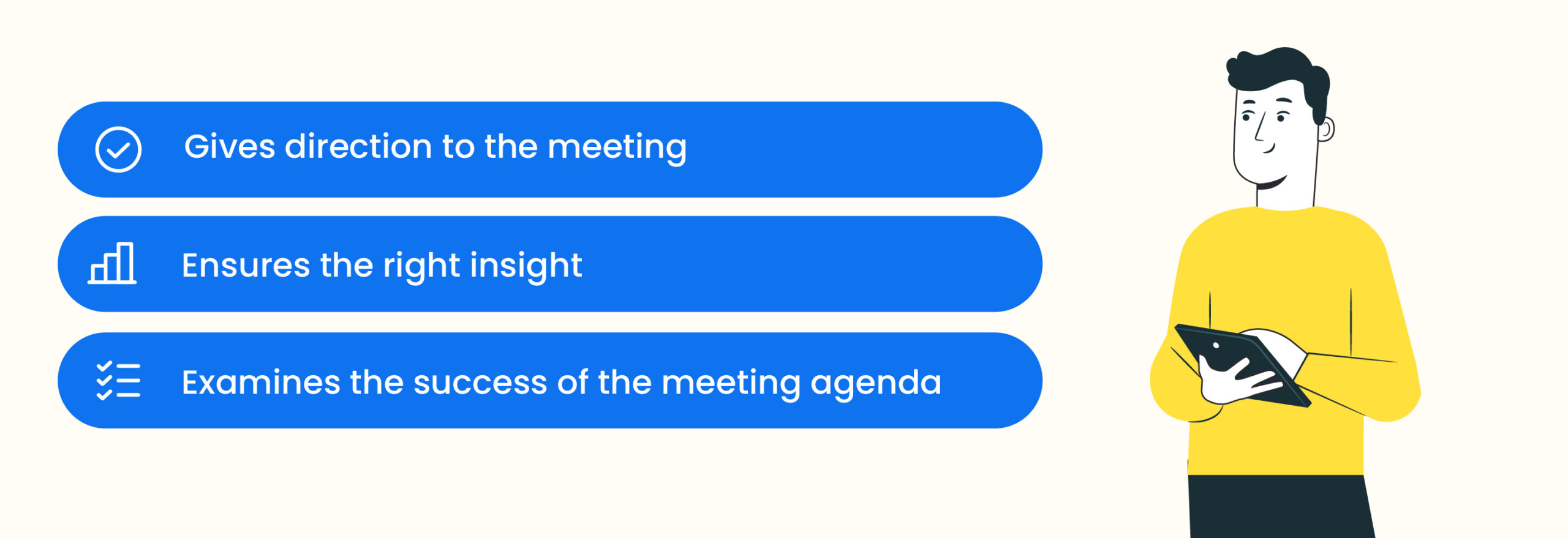One-on-one meetings are essential to establish clear communication between managers and employees. It allows the managers and team leaders to provide feedback, address challenges and check on employee wellness regularly.
While most companies settle on a particular agenda to hold a one-on-one meeting, the success of it depends on how the conversation is conducted. The meeting must have a proper initiation and continuation to make a tangible difference.

With so many elements involved, it is natural to feel confused about how to structure one-on-one meetings. To ensure a smooth flow of conversation, it is recommended to keep a set of questions ready. In case, you are new to creating such templates or conducting one-on-one meetings, we are to help you execute this task, efficiently.
In this blog, we will take you through how to construct an employee one-on-one meeting template to drive visible results.
What is a one-on-one meeting template?
A one-on-one meeting is a scheduled rendezvous with the agenda to connect with your direct reports, discuss their progress, various challenges, and business goals and provide feedback.
A one-on-one meeting template is a set of questions you ask employees to gain meaningful feedback. To maintain consistency in the conversation and keep it aligned with the settled agenda, keeping a template ready is the wiser option.
However, your one-on-one meeting templates must be flexible enough to accommodate additional issues and address different employee concerns.
Why should you use templates?

It is important to ask the right questions at the right time. Using templates ensures the discussion stays on track and gives the best possible results. Here we elaborate a little bit on the reasons why you should use templates for your next one-on-one meeting:
1. Gives direction to the meeting
The goal of one-on-one meeting questions is to engage and bond with different employees. Here, the manager communicates the goals and challenges of the different job positions.
A haphazard questionnaire makes the meeting confusing for both the employee and the manager. It becomes an obligation and not an effective business operation.
Templates ensure you have a structured set of pointed questions to ask the employees. It keeps you prepared to handle the meeting efficiently and gives the conversation a definite direction.
2. Ensures the right insight
By giving it an effective direction, employee one-on-one meeting templates help you get accurate insights into employee progress. It allows you to gauge the type of challenges they face.
You can change your employee management strategy and accommodate their needs more effectively. Using these templates also ensures that you get the correct data to evaluate an employee’s capabilities.
3. Examines the success of the meeting agenda
One-on-one meeting templates help you communicate your expectations to the employee. You are more equipped to give constructive feedback. This, in turn, allows you to evaluate whether your workers have applied your pointers in the future.
The results are easier to measure, which helps you understand what changes you need to make to ensure its effectiveness in the next meeting.
One-on-one templates based on their objectives
Here are some practical one-on-one meeting questions for employees and managers for you to use.
Questions for employees
 Engagement and Morale
Engagement and Morale
- What are you most excited about and most worried about in our team?
- Is there anything you want to change about our team culture?
- How do you prevent burnout?
- How do you keep yourself motivated?
- Is there any disconnect in the team you feel?
 Productivity
Productivity
6. What is the biggest priority for our team at the moment?
7. How can I be of more help?
8. Are there any projects you would like me to contribute more to? Which one?
9. What are your long-term goals for our team?
10. Are you planning to expand the team?
11. Is there something I should keep in mind for our next one-on-one?
 Collaboration and Teamwork
Collaboration and Teamwork
12. Who do you think I should collaborate more with?
13. In case I need your input, what’s the best way to connect with you?
14. What’s your preferred way to receive updates?
15. While working with other teams, what things should I be careful about?
 Growth
Growth
16. What do you think is missing in my growth plan?
17. What technical skills should I improve?
18. Would you like to suggest any soft skills that I should develop?
19. Are there any upcoming events you want me to attend?
20. What are my strengths?
21. What skill gaps do you think are there in our team?
 Feedback
Feedback
22. Is there anything I should do differently? Can you give me some examples?
23. What are my blind spots?
24. Has anyone in the team shared any feedback on my performance?
25. How could I better contribute to our team meetings?
Questions for managers
 Engagement and Morale
Engagement and Morale
26. How are you feeling today?
27. What were your work and non-work highlights last week?
28. What’s on your mind this week at work?
29. What are your priorities for this week?
30. What challenges are you facing right now?
31. Are you capable of disconnecting after work? Why or why not?
 Collaboration and teamwork
Collaboration and teamwork
32. Do you feel like the team is communicating effectively enough?
33. Do you feel you’re able to ask others for help? Why or why not?
34. If not, what do you think is standing in the way of proper communication?
35. Is there an issue in the team that I don’t know about? What is it?
36. Do you feel you connect with everyone on the team? If not, what can I do to help?
37. Which team members do you wish to collaborate more with
 Alignment
Alignment
38. Do you have any questions about the company’s employee strategy?
39. Do you have any questions about our promotion policy?
40. Do you resonate with the current goals of the company?
 Growth
Growth
41. How are you examining your growth goals?
42. Is there a specific part of this business that you want to learn more about?
43. Are there any new skills you’d like to cultivate?
44. Are you interested in any seminars or courses?
45. Are you open to recommendations on the courses?
46. How have you grown since working here?
47. Do you need any specific software or tools to perform better?
 Manager Feedback
Manager Feedback
48. What can I do to make your work life easier?
49. Would you like me to involve you more in team decisions?
50. Do you need any additional input from me?
51. Do you feel our 1:1 meetings are effective enough? Why or why not?
52. How would you like me to share feedback?
53. Would you like me to share updates from the leadership team more frequently?
54. What kind of information do you think would be helpful?
 Productivity
Productivity
55. What is the top priority in your career right now?
56. What challenges do you face in your job role?
57. What challenges can I help you overcome?
58. What’s your plan for next week?
59. Have you planned your work for the next month?
60. Is there anything in particular that frustrates you in your role? What is it?
 Next step
Next step
61. Is there anything you want to add to our agenda?
62. What do you think we should focus more on in our next one-on-one?
63. How can I support you in the meantime?
To Sum Up
Keeping an email template ready will help you properly schedule your meetings every week. You can agree on a suitable day and time for the meeting without a miss. You can also communicate the meeting’s agenda with your employees with an email template.
Scheduling email for one-on-one meetings allows your employees to be prepared and makes them feel comfortable. It helps them structure their queries.
Once you and each employee decide on a time that works for both, schedule the recurring one-on-one meeting on the calendar.
With Leena AI, you can automate the schedule for every one-on-one meeting with no mistakes. From sending one-on-one meeting emails to sharing invitations, the software will handle all the necessary steps. You will never miss a meeting date and your team’s progress will remain consistent.
Moreover, Leena AI also offers a sentiment analysis feature that will help you deeply examine the employee’s responses. You will get accurate insights and can take necessary actions accordingly.
Get your templates in place

While crucial to the progress and productivity of your workforce, weekly meetings can get tedious. But, with the right one-on-one meeting templates, both the manager and the report will feel engaged.
A properly structured one-on-one meeting will drive you towards individual and collective growth. Asking the right questions lets you understand the employee better and empowers you to make changes to the team and your employee strategy.
However, to get the best out of your one-on-one meeting questions, you need automated processes. That’s where Leena AI’s superior employee management features come into play.






